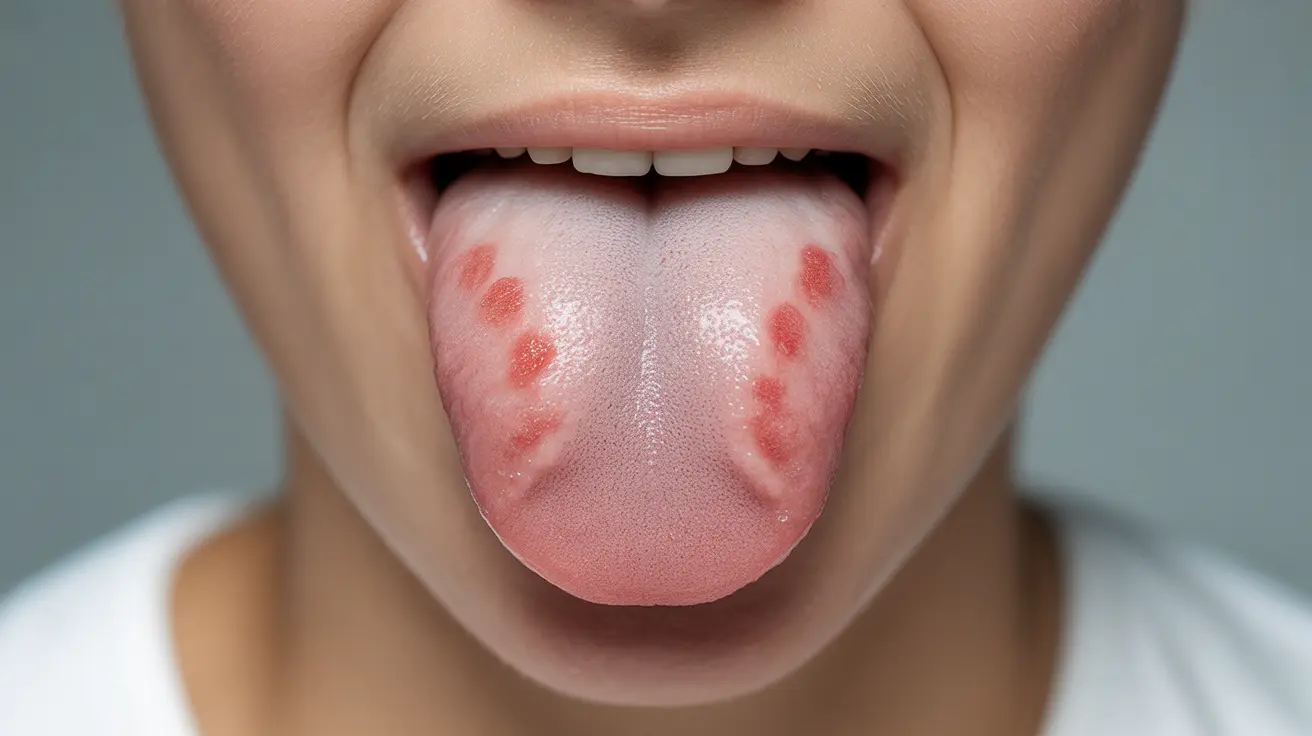Psoriasis on the tongue is a less common but significant manifestation of psoriasis that can affect oral health and quality of life. While psoriasis typically appears on the skin, it can also develop in the mouth, particularly on the tongue, causing distinct symptoms and concerns for those affected.
Understanding this condition is crucial for proper diagnosis and management, as its symptoms can sometimes be confused with other oral conditions. Let's explore the key aspects of tongue psoriasis, including its symptoms, treatment options, and ways to manage this challenging condition.
Signs and Symptoms of Tongue Psoriasis
When psoriasis affects the tongue, it can present with several distinctive characteristics:
- Reddish patches or lesions on the tongue surface
- Smooth or raised areas with defined borders
- White or grayish coating that may come and go
- Changes in tongue texture or appearance
- Fissures or grooves in the tongue
These symptoms may vary in severity and can change over time, making regular monitoring important for effective management.
Diagnosis and Medical Evaluation
Diagnosing psoriasis on the tongue requires careful examination by a healthcare professional, typically a dermatologist or oral specialist. The diagnostic process often involves:
- Physical examination of the tongue and oral cavity
- Review of medical history and existing psoriasis conditions
- Possible biopsy in unclear cases
- Differential diagnosis to rule out other conditions
The Geographic Tongue Connection
Geographic tongue, also known as benign migratory glossitis, shows a strong association with psoriasis. This condition creates map-like patterns on the tongue surface and shares some similarities with psoriatic lesions. Many individuals with psoriasis may also experience geographic tongue, though not everyone with geographic tongue has psoriasis.
Impact on Daily Life and Eating
Tongue psoriasis can significantly affect daily activities, particularly eating and speaking. Common challenges include:
- Sensitivity to hot, spicy, or acidic foods
- Discomfort while eating or drinking
- Changes in taste perception
- Difficulty with certain speech sounds
- Social anxiety related to appearance or symptoms
Managing Flare-Ups and Prevention
While there's no cure for psoriasis, several strategies can help manage tongue symptoms and prevent flare-ups:
- Maintaining excellent oral hygiene
- Using prescribed medications as directed
- Avoiding known trigger foods
- Staying hydrated
- Managing stress levels
- Regular dental check-ups
Treatment Options
Treatment for tongue psoriasis typically involves a combination of approaches:
- Topical corticosteroids designed for oral use
- Systemic medications for severe cases
- Lifestyle modifications
- Dietary adjustments
- Regular monitoring and follow-up care
Frequently Asked Questions
What are the common symptoms of psoriasis on the tongue?
The most common symptoms include reddish patches, smooth or raised areas with defined borders, white or grayish coating, and possible fissures or grooves in the tongue surface.
How is psoriasis on the tongue diagnosed and treated?
Diagnosis involves professional examination by a healthcare provider, potentially including biopsy. Treatment typically combines topical medications, systemic treatments if necessary, and lifestyle modifications.
What is the connection between psoriasis and geographic tongue?
Geographic tongue and psoriasis often co-occur, with geographic tongue being more common in people with psoriasis. Both conditions share similar inflammatory patterns and may have related underlying mechanisms.
Can psoriasis on the tongue cause pain or difficulty eating?
Yes, tongue psoriasis can cause discomfort while eating, especially with spicy, hot, or acidic foods. It may also affect taste perception and make eating certain foods challenging.
How can I prevent flare-ups of oral psoriasis affecting my tongue?
Prevention strategies include maintaining good oral hygiene, avoiding trigger foods, staying hydrated, managing stress, and following prescribed treatment plans. Regular dental check-ups are also important for monitoring the condition.




